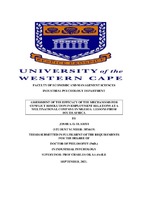Assessment of the efficacy of the mechanisms for conflict resolution in employment relations at a multinational company in Nigeria : lessons from South Africa
Abstract
An organisation or country that aims to experience industrial tranquillity and
collaboration among social partners in employment relations must put in place an
outstanding and potent conflict resolution mechanism. Within the context of labour
relations, conflict is predictable in the workplace environment and the result could be
a strike or lockout. This result can be avoided if there is an appropriate conflict
settlement machinery on the ground. Overall, conflict resolution mechanisms must be
centred around negotiation and dialogue which is an integral part of dealing with
discord whenever it arises in employment relations.
This study seeks to investigate the efficacy of mechanisms for conflict resolution in
employment relations at a multinational company in Nigeria and South Africa. The
study also examines the effectiveness of the machinery for regulating the affairs of
labour relations statutorily or voluntarily. Additionally, the study undertakes a
comparative analysis of different mechanisms employed whenever conflicts arise in
both employment relations environments that are in South Africa and Nigeria. This
analysis gives more insight into how conflict resolution mechanisms work in South
Africa as compared to Nigeria. Moreover, the study explores the necessary tools and
frameworks of legislative resolution instruments that lead to long-term reconciliation
and peace thereby reducing the rate of disputes in employment relations in South
Africa as well as Nigeria.
A non-experimental descriptive research design that utilises a survey approach was
adopted in the study. The research employed a mixed-method approach, that is,
qualitative and quantitative data collection methods. A total of 400 questionnaires were
distributed to respondents in two organisations, 200 for each organisation in Nigeria,
and South Africa respectively via online google forms. A total of 363 responses were
returned for the quantitative data collection while a total of 20 respondents participated
in online interviews as part of the qualitative data collection. Thus, the final aggregate
sample size for this research was 383 participants.
Results from the study indicated that the conflict resolution mechanism in South Africa
functioned successfully compared to that of the counterpart organisation in Nigeria.
Moreover, the study revealed that South Africa has a developed apparatus for
managing industrial conflicts. possibly in Africa as a whole. This was found to be
xi
because of how the South African government rigidly pitched a high labour legislative
framework and requirement concerning labour conflict resolution. This is intended to
create a conducive and harmonious labour relations environment. It is assumed that
introducing a similar legislative framework into Nigeria’s labour relations environment
will also foster a more harmonious relationship amongst the parties and social
partners.
Finally, the study proposes and recommends that host environments of multinational
corporations in Africa must continuously review their conflict resolution frameworks so
that it serves as a guide for the operations of multinational companies that come to
their countries. In addition, the study highlights that such mechanisms must make
provision for opportunities for employees to feel that they are heard through sincere
dialogue processes and effective communication channels between employers and
employees. Overall, the study recommends that accommodating and congruent
conflict resolution strategies must be encouraged among members of staff to facilitate
a nonviolent labour relations atmosphere.

